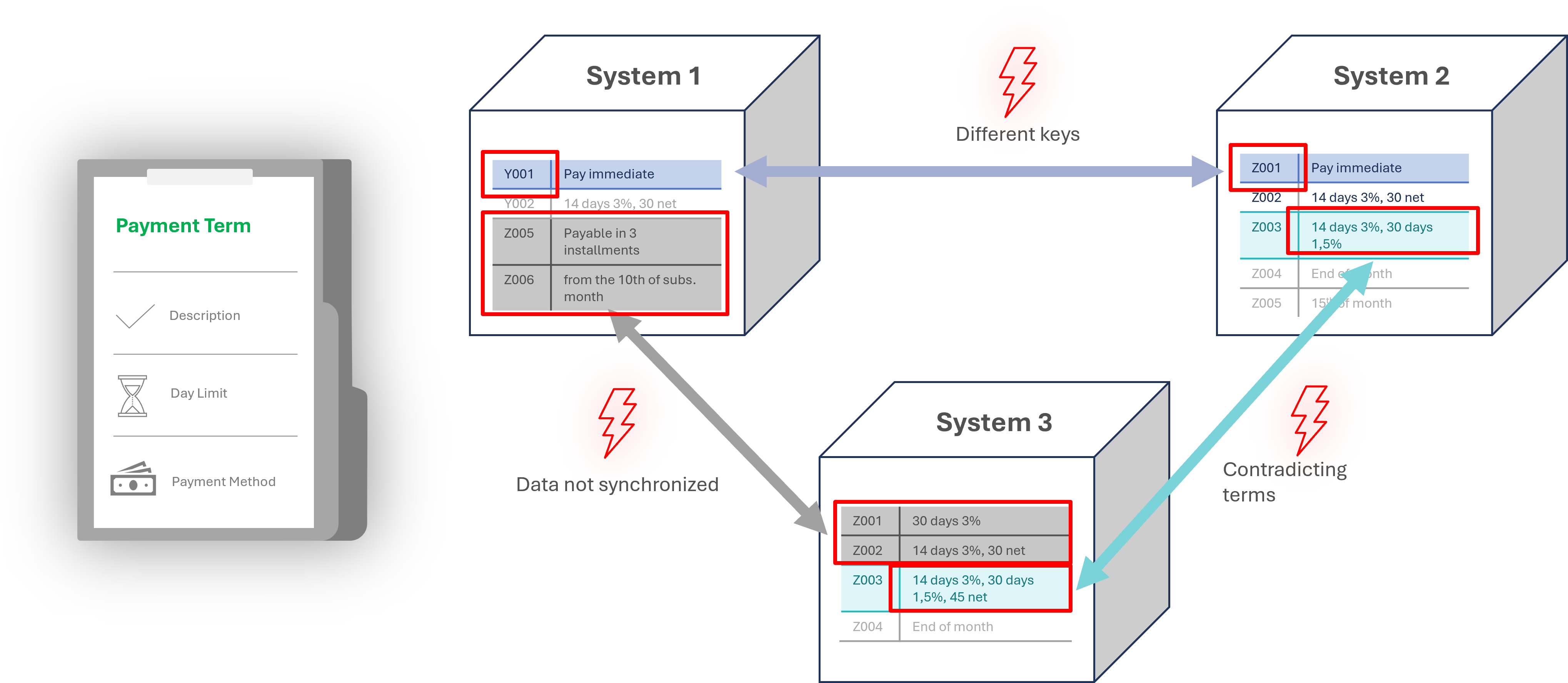
AI-Driven Application & Process Testing: Embracing Agentic Testing
Learn how Agentic AI enables digital transformation, delivering true hyperautomation.

At a time when the business world is characterized by digitalization and complex IT system landscapes, reference data management (RDM) plays a crucial role in the success of companies. In this blog we highlight the importance of effective reference data management and show how companies can significantly increase the quality of their business processes by optimizing their reference data.
As digitalization progresses, companies are increasingly confronted with heterogeneous system landscapes that include SAP and non-SAP systems as well as cloud-based solutions. Consequently, this diversity can lead to inconsistencies and contradictions in the reference data, which impairs the efficiency of business processes. We will describe problems often caused by unsynchronized values of the same reference data in different systems. An example of this (see graphic) is a that may be defined as “pay now” in one system and “pay within 30 days” in another. Such discrepancies can cause considerable disruption to business processes as different systems process different information, leading to confusion and inefficient processes.

One example of the benefits of centralized reference data management is the ability to manage different values for the same reference data type in different systems. For example, the above-mentioned payment term “Pay now” can be defined as “Y001” in one system and “Z001” in another, while a third system, that does not require this information, is not addressed at all. This enables seamless integration and a smooth flow of business processes without data inconsistencies.
The different departments base their actions and decisions on the data in their specific system – we dive deeper into examples of the purchase and IT department in separate blog posts.
Overcoming these challenges requires the implementation of a centralized reference data platform. We emphasize that such a platform enables companies to manage and distribute their reference data efficiently, in one single point. By maintaining and distributing reference data centrally, companies can ensure that all systems are operating with consistent and high-quality data. Besides reducing the likelihood of errors, this also improves the transparency and comprehensibility of business processes.
Once reference data has been defined on a central platform, it can be distributed to all relevant systems. This means that changes to the reference data can be updated immediately in all systems, increasing the efficiency and accuracy of the data. In addition, by using mapping logic, companies can distribute specific data to specific systems, allowing for flexible and on-demand data management.
There are numerous advantages to well-structured reference data management:
Companies able to manage their reference data effectively can optimize their internal processes and increase customer satisfaction. Also, well-founded decisions based on “true” data save costs. We want to emphasize that the standardization and governance of reference data must meet the highest quality standards to achieve the desired results.
We recommend a multi-level approach for efficient reference data management. This includes:
Management of critical reference data supported by a dedicated approval process for data creation and changes. This ensures that all changes to the reference data are controlled and documented.
Centralized coordination and distribution of reference data from a global platform to ensure an orchestrated data supply across the entire system landscape. This reduces complexity and increases the efficiency of data management.
Non-critical or only locally required reference data is managed in the local systems without central approval. This enables flexible handling of data that does not have to fall under strict governance guidelines.
By applying best practices, companies can ensure that their reference data is always up-to-date and consistent. This requires regular review and adaptation of data management processes to changing market requirements. Camelot’s Reference Data Management solution helps you to keep data quality at the highest level.
Another important aspect is the need for staff training in reference data management. The introduction of new systems and processes requires staff training to enable them to use the modern technologies effectively. Training programs are crucial to ensure the team is familiar with the new standards and procedures. Companies should invest in training their employees to ensure the quality of reference data management.
In summary, it can be said that reference data management is a key success factor for companies that want to survive in an increasingly digitalized and complex business world. With its approaches and best practices, we offer valuable impulses for increasing the quality of business processes through effective reference data management. Companies that are able to manage their reference data efficiently can not only optimize their internal processes, but also secure their competitiveness on the global market.
Overall, we can determine that reference data can contribute to efficient business processes and support the intelligent enterprise of the future. Companies that recognize and implement these trends at an early stage will be able to hold their own in an increasingly competitive environment. The challenges are great, but the opportunities arising from effective reference data management are just as promising. Those who proactively adapt to these developments can not only optimize their internal processes, but also gain a sustainable competitive advantage.
Read more about our solution.

Learn how Agentic AI enables digital transformation, delivering true hyperautomation.

Reimagine resilience and proactively minimize supply chain risks

This article shall help you to understand how to optimize your inventory positions in a month – or even less.

Modern PLM systems empower businesses to achieve product excellence in fast-paced markets by enhancing collaboration, agility and innovation.
© Camelot Management Consultants, Part of Accenture
Camelot Management Consultants is the brand name through which the member firms Camelot Management Consultants GmbH, Camelot ITLab GmbH and their local subsidiaries operate and deliver their services.